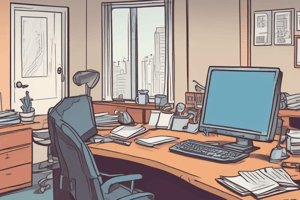Podcast
Questions and Answers
It is important to limit discussions about coworkers' private lives within the workspace.
It is important to limit discussions about coworkers' private lives within the workspace.
False (B)
Using sticky notes to cover monitors is a recommended practice for desk etiquette.
Using sticky notes to cover monitors is a recommended practice for desk etiquette.
False (B)
Arriving on time for meetings and notifying attendees if running late is considered part of meeting room etiquette.
Arriving on time for meetings and notifying attendees if running late is considered part of meeting room etiquette.
True (A)
It is acceptable to have cell phones visible and ringing during office meetings.
It is acceptable to have cell phones visible and ringing during office meetings.
Respecting standard working hours displays irresponsibility towards the job.
Respecting standard working hours displays irresponsibility towards the job.
It is important to avoid gossiping about colleagues in the workplace.
It is important to avoid gossiping about colleagues in the workplace.
One should not leave leftovers uncovered in shared spaces like the cafeteria.
One should not leave leftovers uncovered in shared spaces like the cafeteria.
Dressing professionally is always more important than feeling comfortable in what you wear.
Dressing professionally is always more important than feeling comfortable in what you wear.
When addressing conflicts with coworkers, it is advisable to seek advice from higher authority figures first.
When addressing conflicts with coworkers, it is advisable to seek advice from higher authority figures first.
Using mobile phones discreetly during office hours is considered good etiquette.
Using mobile phones discreetly during office hours is considered good etiquette.
Flashcards are hidden until you start studying
Study Notes
Navigating Office Etiquette with Confidence
Office life is a delicate balance of professionalism and camaraderie, where respectful interactions foster a positive work environment. In this guide, we'll explore essential elements of office etiquette, offering insights into behaviors you may find useful when navigating your workplace.
Gossiping
Conflict can arise from idle chatter, so it's vital to keep personal conversations within appropriate limits. Limit discussions about coworkers' private lives or performance reviews to trusted confidants outside the workspace. If a colleague shares something sensitive overheard between others, respond graciously by changing the subject without passing judgment.
Desk Etiquette
Respect your workspace by keeping it neat and orderly. Declutter regularly, avoid using sticky notes covering monitors, and label cords to prevent accidental disconnection. Invest in quality headphones if necessary to focus without disturbing others or being disturbed yourself.
Meeting Room Etiquette
Arrive on time—if running late, notify attendees politely and apology sincerely. During meetings, remain focused while showing interest by asking questions and actively participating rather than merely nodding along. Leave cell phones silenced and out of sight to encourage full attention throughout.
Office Timings
Respecting standard working hours displays responsibility and commitment towards your job. However, some situations might necessitate flexible schedules; manage these cases courteously, ensuring team members do not suffer due to noncompliance with agreed upon arrangements.
Usage of Cafeteria
Be considerate when using shared spaces like kitchens and break areas. Wash dishes promptly after eating, refrain from leaving leftovers uncovered, and observe hygiene standards while preparing or consuming food.
Dress Etiquettes
Dress codes vary across organizations, cultures, and industries. It's essential to familiarize oneself with company guidelines and adapt accordingly. While dressing professionally instills confidence, remember to feel comfortable in what you wear.
Speaking to Colleagues
Avoid unnecessary conflicts through polite behavior. Listen to differing opinions, providing constructive feedback instead of criticism. When delivering feedback, maintain eye contact, speak clearly, and address concerns directly yet tactfully.
Handling Conflicts
In case of disagreements with coworkers, endeavor to resolve them amicably before they escalate. Communicate openly, expressing your views calmly, and listening patiently to understand each other's perspectives. Seek advice from higher authority figures only if necessary, aiming always to preserve workplace harmony.
Mobile Phone Use
Minimize interruptions caused by ringtones and alerts during office hours. Respond to urgent calls discreetly, avoiding long conversations. Remember, some people may not appreciate receiving unsolicited messages or emails related to their personal lives via corporate devices.
Etiquette isn't just about restraint—it also involves demonstrating consideration towards fellow employees. By implementing such practices consistently, every individual helps nurture a vibrant, collaborative atmosphere conducive to productivity and growth.
Studying That Suits You
Use AI to generate personalized quizzes and flashcards to suit your learning preferences.




